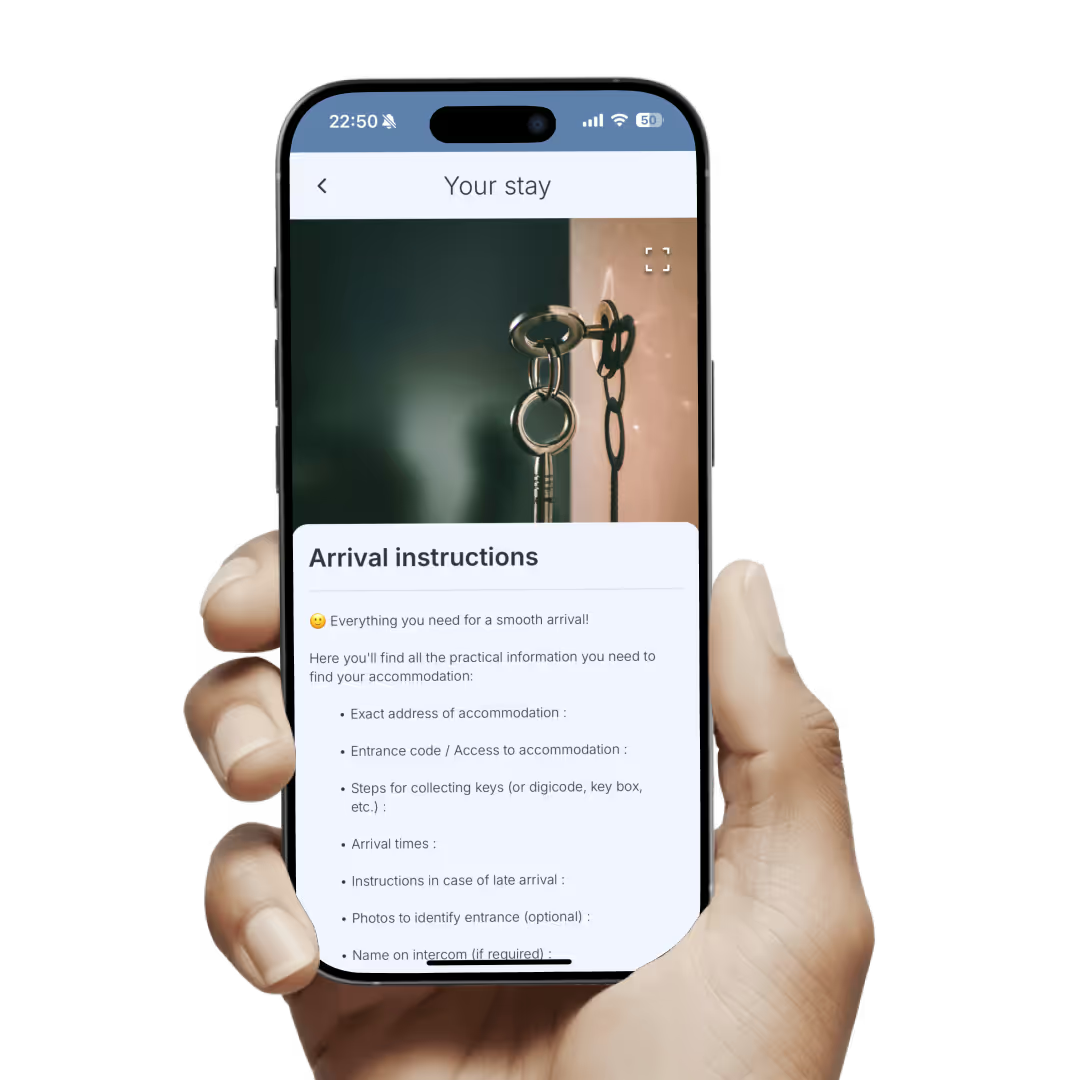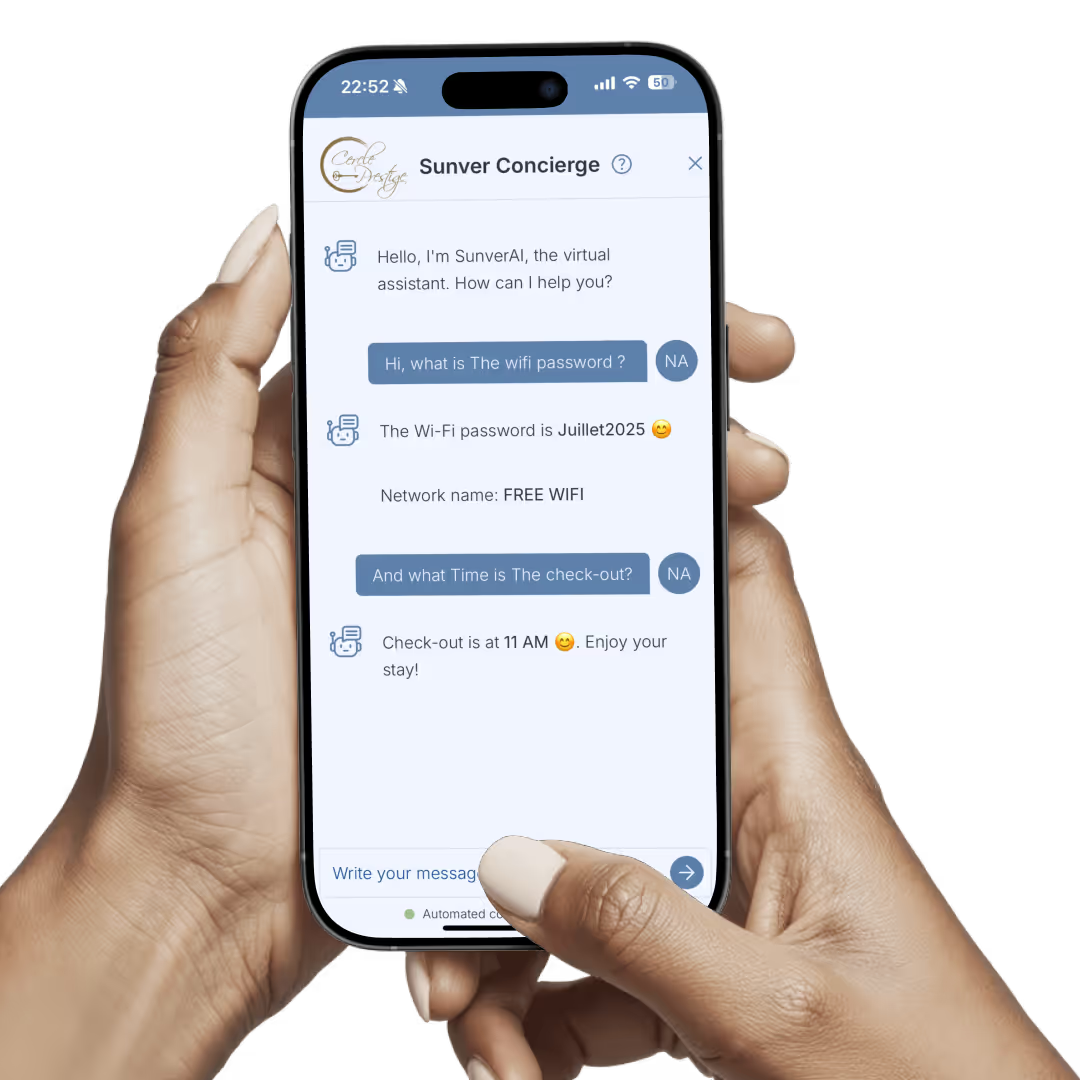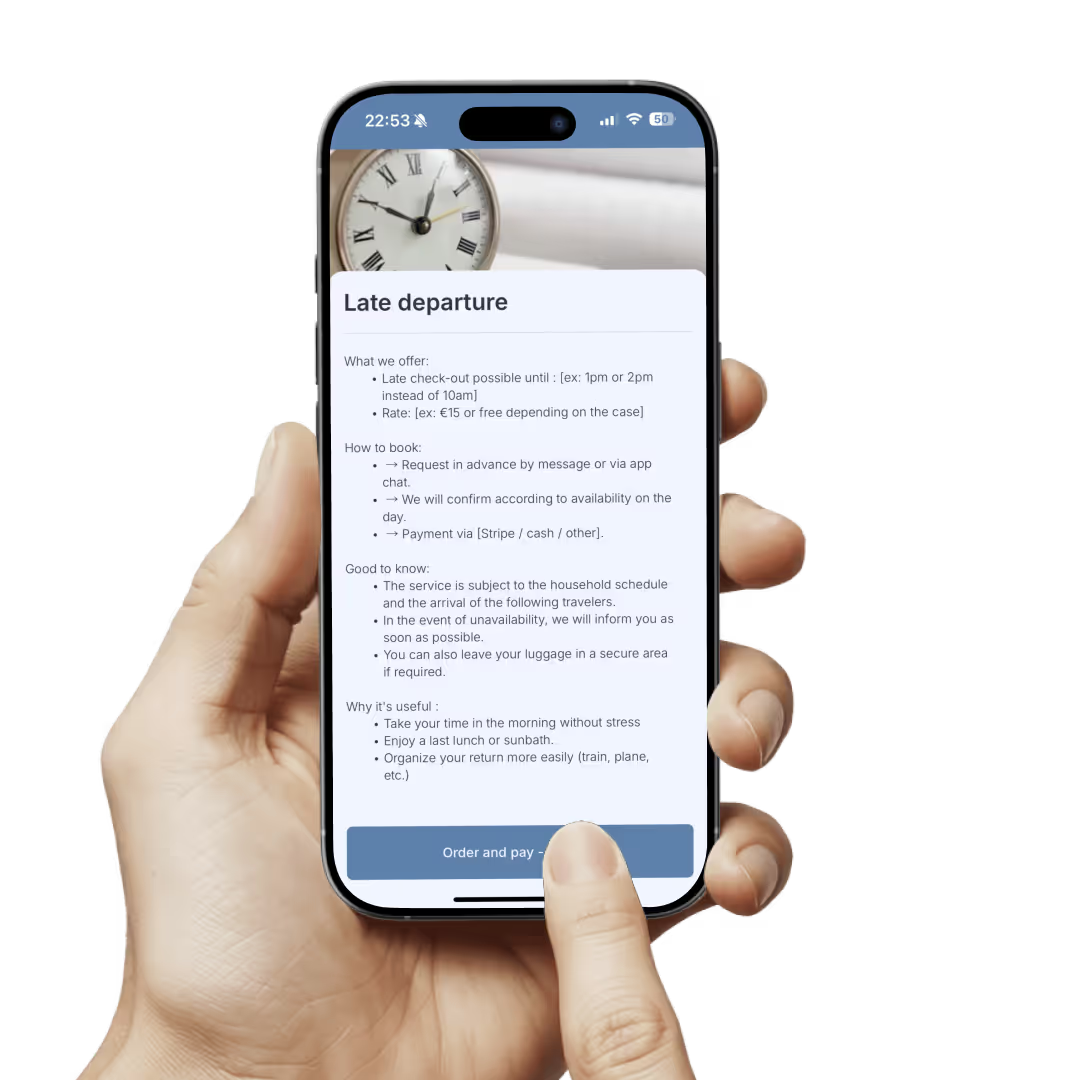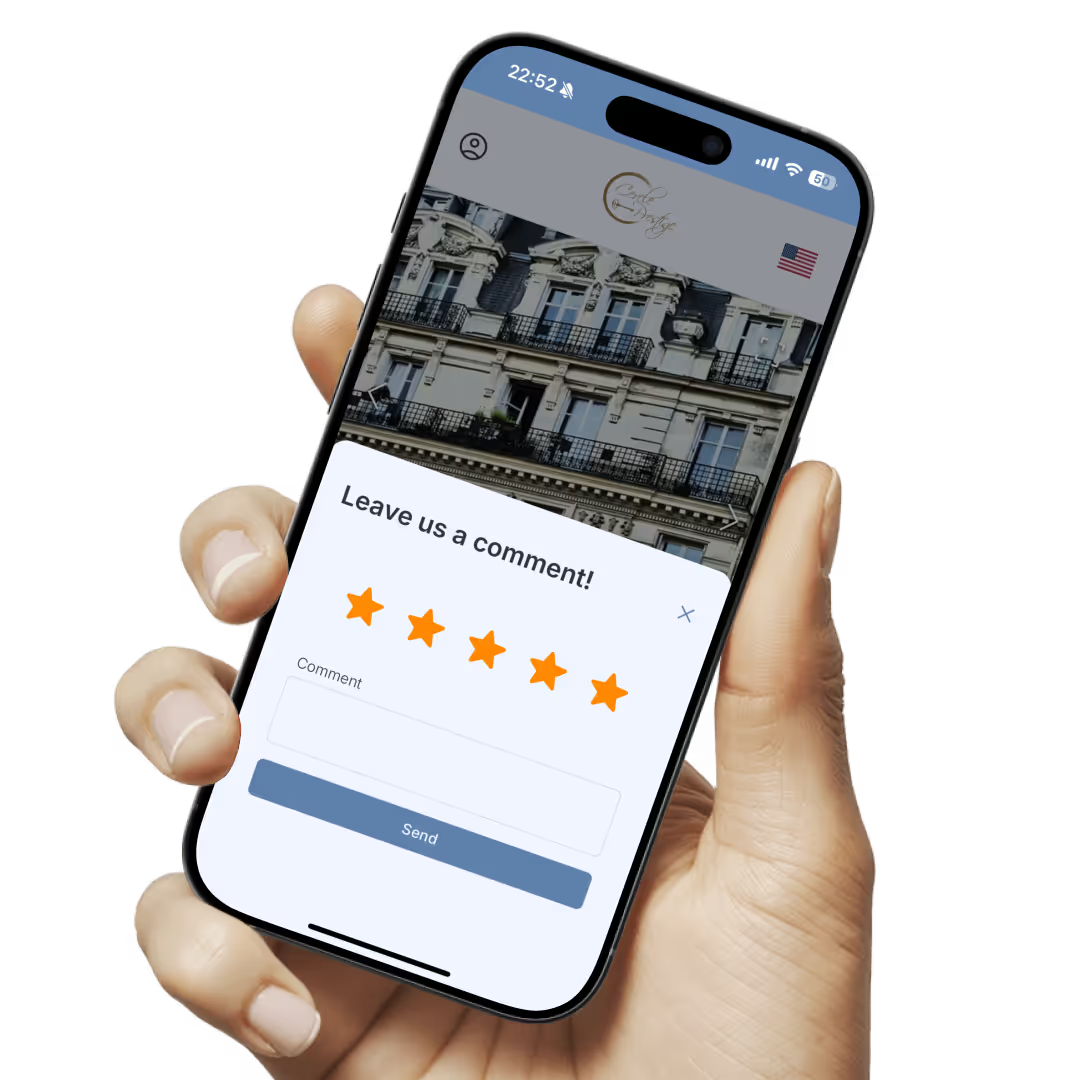Guest App: what is it, what is it used for, and how to use it effectively?
A guest app centralizes all essential stay information and gives easy access to services directly from a smartphone. It enhances the guest experience, reduces repetitive requests, and creates new revenue opportunities. Today, it has become a key tool for hotels and short-term rentals.

What is a guest app?
A guest app centralizes all essential information related to a stay and provides access to various services from a smartphone or tablet, through a web link or a simple QR code scan.
Its main features include:
- Immediate access to practical information: check-in instructions, Wi-Fi codes, house rules
- Online booking and payment of additional services (cleaning, late check-out, transfers, meals)
- Local recommendations and tips
- Practical guides and manuals for using equipment
- Simplified communication, sometimes multilingual, via messaging or a chatbot
Guest App: native application or web application?
Not all guest apps take the same form. They can be divided into two main models:
Native application
Downloadable from the App Store or Google Play, the native application can provide advanced features and even work offline. However, it requires prior installation, takes up storage space on the device, needs regular updates, and is rarely used for short stays.
Web application
Accessible directly through a browser (via a link or a QR code), this format requires no download. Lightweight and universal, it offers immediate access to essential information.
The web app format is generally preferred, as it tends to be easier and faster for guests to use.
Why has the guest app become essential?
With the rise of digital tools, traveler expectations have changed. Today, everything is expected to be accessible instantly on a smartphone, without waiting for explanations or searching through a paper welcome book.
For guests:
24/7 access: all information is available at any time, even outside reception hours.
Fewer errors: house rules, instructions, and manuals are clear and easy to follow, reducing misunderstandings (with the option to add videos if needed).
Simplified discovery of the destination: access to local recommendations, maps, and tips, with direct links to Google Maps for instant directions.
Centralization: Wi-Fi codes, check-in details, equipment guides, and services are grouped in one place, avoiding scattered emails and documents.
Simplified interaction: questions or requests can be made directly through the app, without needing calls or SMS.
Secure payments: additional services can be booked and paid for online, ensuring a seamless experience.
Modern and premium experience: enhances the perception of a professional and digitalized service.
For hosts and managers:
Fewer repetitive requests: guests access information autonomously, reducing common questions (Wi-Fi, check-in, equipment).
Additional revenue channel: extra services can be booked and paid for directly within the app.
Professional image: strengthens the digital identity of the accommodation and differentiates it from competitors.
Data insights: usage analytics provide a better understanding of guest preferences and support loyalty strategies.
Instant updates: changes to Wi-Fi, rules, or services are updated in real time, without reprinting or sending outdated PDFs.
Improved reviews: smoother communication and autonomy lead to higher satisfaction and better ratings on platforms like Airbnb, Booking, or Google.
Real-life use cases
Property management company
A property manager overseeing several apartments uses a guest app to share digital welcome books. From the moment they arrive, guests can access Wi-Fi, house rules, equipment guides, and even book a late check-out.
Observed result: a sharp reduction in repetitive questions and a significant increase in upsell revenue.
Independent hotel
An independent hotel offers a guest app accessible via QR codes placed in the rooms. Guests benefit from a direct call button to the reception, digitalized room service with integrated payment, spa opening hours with online booking, and a clear presentation of eco-friendly commitments.
Observed result: increased use of the spa and restaurant, additional points gained toward Green Key certification, and fewer calls to reception.
Campsite
A camping proposes a guest app that provides the daily program of activities, booking slots for the water park, an interactive site map, and practical instructions (water supply, electricity, charging stations)
Observed result: better on-site organization, shorter waiting lines, and a smoother overall guest experience.
Guest App vs Digital Guestbook vs Room Directory
The room directory is the traditional in-room information binder, often paper-based or in PDF format on a TV or tablet. It contains practical details but is static, hard to update, and not guest-friendly for international travelers.
The digital guestbook goes further: accessible via link or QR code, it centralizes essential info (Wi-Fi, rules, amenities, local tips) in a modern, mobile format. However, it remains mostly consultative.
The guest app adds an interactive dimension: live chat, service reservations, online payments, real-time notifications. It becomes a true communication and upselling tool, boosting both guest experience and profitability.
Business Advantages of a Guest App
Implementing a guest app is not just about comfort, it’s a growth driver:
Increased revenue: upsell services are digitized. Existing solutions allow guests to pay instantly via Stripe integration.
Reduced operational costs: centralized information, integrated FAQ, and AI chatbots handle repetitive questions automatically.
Better online reviews: an autonomous, satisfied guest is more likely to leave 5 stars. A built-in CTA can even redirect directly to Google Reviews.
Loyalty and retention: a modern, seamless experience leaves a lasting impression, improving guest satisfaction and encouraging repeat bookings.
How to Choose the Right Guest App
Not all guest apps are equal. Key criteria to consider:
- Accessibility: must be easy to use. Downloaded apps discourage short-stay guests, while web apps accessible via QR code or link (like Sunver) guarantee instant, frictionless access.
- Ease of updates: information changes frequently (Wi-Fi, schedules, services). A good guest app should allow real-time updates through a simple dahsboard.
- Multilingual support: automatic translation is essential. The app should detect the guest’s language and display content instantly in their own language.
- Payment integration: upsell services (cleaning, late check-out, transfers, dining) should be bookable and payable directly in the app.
- Customization: must reflect your brand identity, logo, colors, tone, building trust and professionalism.
- Artificial Intelligence (AI): modern guest apps integrate AI guest assistant that analyze guestbook content and instantly answer FAQs, reducing host workload and improving response times.
Conclusion
The guest app has become an essential tool for hotels, property managers, and short-term rental operators. It centralizes key information, streamlines communication, and allows guests to interact directly from their smartphone. Beyond enhancing the guest experience, it serves as a powerful driver of growth, differentiation, and professionalism in a rapidly evolving hospitality market.
Discover for free how a guest app can simplify management and modernize the guest experience.
Much more than a welcome guidebook
A web application accessible without download, via QR code or link, automatically translated into your guest’s language.




Frequently asked questions
Everything you need to know about Sunver.
What is Sunver?
Sunver is a solution that allows you to easily create your own digital welcome guidebook to simplify communication with your guests. It enhances the guest experience, saves you time every day, and helps you generate additional revenue. Setting up a guidebook is intuitive—similar to creating a Facebook profile.
How do I set up Sunver?
You can create your first guidebook directly from our website in just a few minutes and experience the simplicity of the solution for yourself. If you are a hospitality professional, our team also offers a full demo via video call, helping you with setup and customization.
How can I share my guidebook with guests?
There are two main ways to share your guidebook:
1. Send the link directly after booking or during the stay through your automated messages.Provide
2. QR code displays inside your accommodation so guests can scan and access the guidebook instantly.
You can also print your display for free from your Sunver dashboard or order physical QR code supports directly from our website.
Do my guests need to download anything?
No, your guests don’t need to download anything. Sunver runs as a web app, meaning it’s hosted online, loads quickly, and is instantly accessible. Thanks to automatic translation, the guidebook will open directly in the guest’s phone language.
Can I promote my additional services with Sunver?
Yes, absolutely. With the guidebook modules, you can create a true digital shop and showcase your services, products, or exclusive offers. By connecting your Stripe account, you can accept payments directly without any commission taken by Sunver. Guests can pay in just one click from their smartphone.
The digital welcome guide your guests deserve
Give your guests a seamless experience — all your information, services, and recommendations, right at their fingertips.
